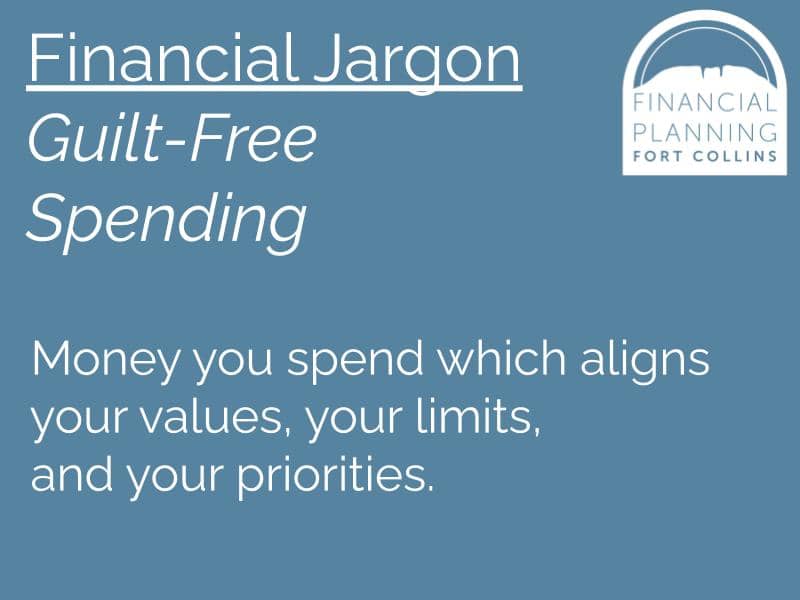
For example, we encourage clients to address these areas of your life:
- An emergency fund.
- Retirement planning.
- Education savings.
- Future financial goals.
- Debt management.
- Heath savings accounts for future health-related expenses.
- Insurance to address your risk management (including your own death).
- Estate planning (to plan for your death).
- And, sometimes the biggest bummer of them all: Taxes.
Can you hear the tuba going “wahhh-wahhh”? The above subjects may be dry, but fiscally responsible people address them.
Yet, as we learned from Stephen King’s The Shining, “All work and no play make Jack a dull boy.”
To combat this “Debbie-downer” reputation, we like to take a different approach. Many people don’t expect to hear this from a financial planner:

The Right Way to Enjoy
In regard to enjoying your money, we recommend you set up systems so you don’t overextend yourself.
Cue the tuba: Many Americans like to spend now and hope to pay later. This can cause debt problems.
People overextend themselves and end up paying for it (literally). When people acquire debt because of excessive spending, credit card companies make a substantial profit from people with high interest rates.
According to Wallethub, the average credit card interest rate in 2020 is 19.02%. That means, if you don’t pay off your credit card in full, you’ll pay $20 to borrow $100. This can spiral out of control if not managed properly.
▶︎ Pro tip: Fund your lifestyle, hobbies, and fun money while also being responsible.
Don’t overextend yourself and don’t finance your hobbies with credit cards. Loans are best for investments from which you expect a higher return than the loan itself — like your income with an education loan, a business loan to start a hopefully valuable asset, or a mortgage for a house that will become more valuable.
This way, you can grow your financial net worth by growing your assets at a faster rate than your liabilities. And then you can really enjoy your money like the fictional character Scrooge McDuck.
According to Forbes, Scrooge McDuck is literally swimming in the money. His money pit and his companies make him the sixth richest fictional character of all time with a financial net worth of $8.2 billion. Not bad for a Cluck University dropout.
Align Your Budget
You work hard for your money. You became responsible in addressing your money by becoming a client. Now it’s time to position your money to let yourself cut loose — and be happier.
Whichever budgeting strategy you choose, earmark money in your cash flow for your hobbies and life’s overall pleasures.
No need for a tuba here because your budget frees you up to enjoy your money. You can then enjoy the luxury of what’s known as guilt-free spending!

Ensure You Do It
Don’t fall victim to freezing your money and denying yourself vacations, hobbies, or your preferred treats. Put systems in place so you can enjoy your money along your life’s adventure while also not overextending yourself into credit card debt.
Still having a tough time cutting loose? Here are two strategies we encourage clients who have a tough time allowing themselves to indulge every once in a while.
▶︎ See your enjoyable spending as a reward for accomplishing your other financial goals.
▶︎ Schedule time on your calendar for sometime in the future so you can enjoy your money.
Intentionally spend your money to make yourself happier:
- Shared experiences with others.
- Spend money to give yourself more time for leisure and/or opportunities.
- Experience the pain of paying now so you can enjoy a future purchase.
- Treat yourself with little pleasures.
- Spend money to benefit others.
Worksheet: Happier Spending
We enjoy creating worksheets to help you become more responsible with your finances. Now, here’s a worksheet to help you enjoy your money!
You may notice a theme within multiple modules that we prefer S.M.A.R.T. goals. These types of goals allow you to make more realistic goals that hopefully inspire follow-through.
As a reminder, S.M.A.R.T. is an acronym for:
S – Specific: you state the task you want to accomplish
M – Measurable: your progress can be tracked
A – Attainable: your goal excites you and motivates you
R – Realistic: your goal can be realistically achieved with your resources and time
T – Time-Oriented: you have a deadline for this goal
So, instead of a goal saying, “I want to start saving more money,” an example of a S.M.A.R.T. goal reads like, “I will save $500 in my savings account in one month.”
S – Specific: you state that you want to save money
M – Measurable: you can measure if you have $500 in your savings account
A – Attainable: this goal is motivating you because of your desire to save money
R – Realistic: this goal isn’t too far out of reach like saving $10,000 in one month
T – Time-Oriented: you gave yourself a month deadline
Now, go and enjoy your money! You’ve earned it!
This article gives you a glimpse of the “Hobbies and Happier Spending” e-learning module. Access these personal finance modules and so much more by becoming a client.
